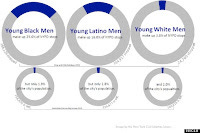Why is the NYPD allowed to violate our Constitution?

NY- The federal courts are bearing down on the New York City Police Department’s constitutionally suspect stop-and-frisk program, under which hundreds of thousands of citizens are stopped on the streets each year, often illegally and for no discernible reason. Earlier this month, the federal judge who is presiding over three lawsuits that challenge different parts of the program issued her harshest ruling yet, putting the city on notice that some aspects of stop and frisk are clearly unconstitutional.
The ruling, by Judge Shira Scheindlin of Federal District Court in Manhattan, came in the case of Ligon v. the City of New York. The case was brought on behalf of people who say they were illegally stopped, given tickets or arrested on trespassing charges in private apartment buildings, some of them in buildings where they lived.
The judge excoriated the city for flagrant indifference to the Fourth Amendment. The amendment has been interpreted by the courts to mean that police officers can legally stop and detain a person only when they have a reasonable suspicion that the person is committing, has committed or is about to commit a crime.
The department’s patently illegal strategy, the judge said, encouraged officers to “stop and question first, develop reasonable suspicion later.” The ruling focuses on detentions that occurred as people were entering or leaving one of many residential buildings in the Bronx whose managers had simply asked the department to patrol the area and arrest trespassers.
The Trespass Affidavit Program, or TAP, has thus not only led to unjustified detentions but has also placed untold numbers people at risk of detention merely for entering their own homes or visiting friends and relatives. Their experiences, as described in the ruling, makes perfectly clear why the largely minority citizens targeted and victimized by the program come away feeling angry and ill used.
Describing the typical, humiliating sequence of events, the judge wrote: “The police suddenly materialize, stop the person, demand identification, and question the person about where he or she is coming from and what he or she is doing.” She added that “attempts at explanation are met with hostility; especially if the person is a young black man, he is frisked, which often involves an invasive search of his pockets; in some cases the officers then detain the person in a police van,” where he or she is grilled about drugs or weapons. In some cases, the stop escalates into an arrest, the judge noted, with the person fingerprinted and held overnight. Even if the charges are quickly dropped, the arrest can follow the person for years.
The judge tore into the city for persisting in this behavior even after prosecutors and department lawyers had become aware that unlawful stops were occurring. In 2011, for example, the Bronx prosecutor’s office become so concerned about the legality of stops made outside the TAP buildings that it routinely declined to prosecute cases based on them.
Judge Scheindlin ordered the Police Department to immediately cease trespass stops outside TAP buildings unless officers have the reasonable suspicion required by law, though she has issued a temporary stay. She has also scheduled a remedy hearing in March, at which time she could require the city to take various remedial steps, including a formal written policy explaining the circumstances under which officers can legally stop people on suspicion of trespass.
There are other procedures that can be followed without threatening law enforcement. Instead of defending the indefensible, the city should finally bring the stop-and-frisk program into line with the law.
http://www.nytimes.com/2013/01/26/opinion/when-police-violate-the-constitution.html?_r=2&


